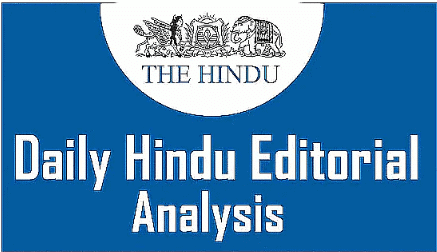UPSC Exam > UPSC Notes > Current Affairs & Hindu Analysis: Daily, Weekly & Monthly > The Hindu Editorial Analysis- 8th April 2025
The Hindu Editorial Analysis- 8th April 2025 | Current Affairs & Hindu Analysis: Daily, Weekly & Monthly - UPSC PDF Download

Shaping a future-ready workforce
Why is it News?
- India is facing a significant challenge in preparing its workforce for rapid global changes driven by technology, climate goals, and economic shifts.
- Recent reports, such as the Future of Jobs Report 2025 by the World Economic Forum and the World Future Skills Index by QS, emphasize the urgent need to align education with future job market demands.
Key Drivers of Change in the Labour Market
- The global job market is undergoing major changes due to factors like technology, shifting population patterns, economic instability, global tensions, and the green transition.
- Around 60% of employers believe that technological progress and better digital access will be significant forces shaping jobs by 2030.
- About 50% of employers think economic factors, such as job losses in traditional industries, will also play a crucial role.
- Climate change is creating new job opportunities in renewable energy and forcing businesses to adapt their operations.
- By 2030, the global market may see 170 million new jobs but also lose around 92 million due to shifting needs.
Workforce Training and Skill Needs
- In response to these changes, companies are focusing on training workers, offering better wages, and supporting employee well-being.
- About 59 out of every 100 workers will need to learn new skills, especially in analytical thinking, resilience, and technology use.
- Jobs in fields like Big Data and Artificial Intelligence are expected to grow quickly, requiring strong technical and thinking skills from workers.
- Soft skills such as emotional intelligence, adaptability, and leadership are becoming increasingly important for success in a changing work environment.
India’s Strengths and Gaps in Workforce Preparedness
- According to the QS World Future Skills Index, India ranks second globally in preparing for AI and green skills, indicating significant potential.
- However, India scores only 59.1 in ‘Skills Fit’, showing that its workforce is not fully ready to meet future job demands.
- Despite scoring 99.1 in identifying and hiring for future skills, India struggles with preparing individuals for these roles.
- India ranks 26th in ‘Academic Readiness’, highlighting gaps in promoting innovation and entrepreneurship in education.
- With a very low score of 15.6 in innovation and sustainability readiness, India lags in preparing for future green technologies.
- Limited spending on research and development hinders India’s ability to compete globally in renewable energy and eco-friendly innovations.
A Way Forward: Education and Industry Partnership
- India has a significant opportunity to upgrade its education system to align with global job trends.
- Colleges and universities should emphasize creativity, problem-solving, and entrepreneurial skills through interactive and real-world learning methods.
- Initiatives like hackathons, startup hubs, and design workshops can help students become more adaptable and innovative.
- A green-focused education is essential, involving research centres and community projects that address local environmental issues.
- Collaborating closely with companies will enable colleges to develop better job-ready courses and provide real job experiences through internships.
- Teachers also require training through workshops, certifications, and global exchange programmes to enhance their skills.
Conclusion
- The government should take the lead by investing more in skill-building, research, and rural digital infrastructure to bridge gaps between urban and rural areas.
- A robust policy framework is necessary to make India’s higher education system flexible and capable of addressing future challenges.
The document The Hindu Editorial Analysis- 8th April 2025 | Current Affairs & Hindu Analysis: Daily, Weekly & Monthly - UPSC is a part of the UPSC Course Current Affairs & Hindu Analysis: Daily, Weekly & Monthly.
All you need of UPSC at this link: UPSC
|
38 videos|5338 docs|1129 tests
|
FAQs on The Hindu Editorial Analysis- 8th April 2025 - Current Affairs & Hindu Analysis: Daily, Weekly & Monthly - UPSC
| 1. What does it mean to have a future-ready workforce? |  |
Ans. A future-ready workforce refers to employees who possess the skills, adaptability, and mindset necessary to thrive in an evolving work environment. This includes being proficient in digital tools, possessing critical thinking abilities, and being open to continuous learning and development to meet the demands of a rapidly changing job market.
| 2. What skills are essential for a future-ready workforce? |  |
Ans. Essential skills for a future-ready workforce include digital literacy, emotional intelligence, adaptability, problem-solving, collaboration, and communication skills. Additionally, technical skills related to specific industries and a willingness to engage in lifelong learning are also crucial.
| 3. How can organizations prepare their employees for future challenges? |  |
Ans. Organizations can prepare their employees by investing in training and development programs that focus on emerging technologies, providing opportunities for skill enhancement, fostering a culture of innovation, and encouraging a growth mindset. Regular assessments and feedback can also help in identifying areas for improvement.
| 4. What role does technology play in shaping a future-ready workforce? |  |
Ans. Technology plays a significant role by enabling new ways of working, facilitating remote collaboration, and providing tools for upskilling and reskilling. Organizations can leverage artificial intelligence, data analytics, and automation to enhance productivity and support employees in adapting to new challenges.
| 5. Why is continuous learning important for a future-ready workforce? |  |
Ans. Continuous learning is crucial because it helps employees stay updated with industry trends, develop new skills, and remain competitive in the job market. As industries evolve, the ability to learn and adapt quickly becomes a key factor in individual and organizational success.
Related Searches
















